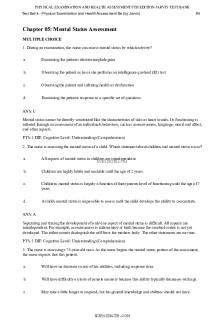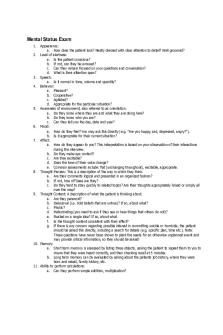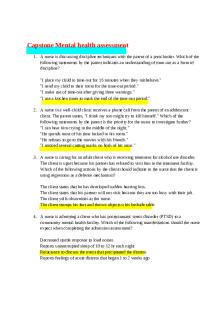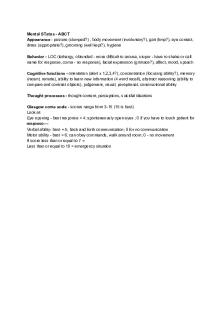Mental Status Assessment PDF

| Title | Mental Status Assessment |
|---|---|
| Author | Lauren Cabrera |
| Course | Health Assessment |
| Institution | Nova Southeastern University |
| Pages | 6 |
| File Size | 94 KB |
| File Type | |
| Total Views | 139 |
Summary
Download Mental Status Assessment PDF
Description
Mental Status Assessment Mental Status ◦ Mental status is a person’s emotional and cognitive functioning o Optimal functioning aims toward simultaneous life satisfaction in work, caring relationships, and within the self o Usually, mental status strikes a balance between good and bad days, allowing person to function socially and occupationally o Are they alert, awake, and oriented o Cognitive: can they think it through, does their behavior make sense for the situation, the ability to think things through Mental Status Structure and Function ◦ Mental disorder ◦ Significant behavioral or psychological pattern associated with the following: o Distress, a painful symptom o Disability, impaired functioning o Significant risk of pain, disability, or death, or a loss of freedom o A diagnosis that falls under the psychiatric umbrella ◦ Organic disorders ◦ Due to brain disease of known specific organic cause (e.g., delirium, dementia, alcohol and drug intoxication and withdrawal) ◦ From a natural state ◦ Psychiatric mental illnesses ◦ Organic etiology has not yet been established (e.g., anxiety disorder or schizophrenia) ◦ Mental status assessment documents a dysfunction and determines how that dysfunction affects self-care in everyday life Defining Mental Status ◦ Mental status cannot be scrutinized directly like the characteristics of skin or heart sounds ◦ Mood and Affect: movements out of the normal, pace of speaking, twitching, do they think something is there when there isn’t anything actually there ◦ Its functioning is inferred through assessment of an individual’s behaviors: ◦ Consciousness ◦ Language ◦ Mood and affect ◦ Orientation ◦ Attention ◦ Memory ◦ Abstract reasoning
◦ ◦ ◦
Thought process Thought content Perceptions
Question ◦ Which of the following basic functions should the nurse test first in an assessment of mental status? 1. Behavior 2. Consciousness 3. Judgment 4. Language Developmental Competence Aging adults ◦ Older adulthood contains more potential for losses ◦ Grief and despair surrounding these losses can affect mental status and can result in disability, disorientation, or depression ◦ Chronic diseases such as heart failure, cancer, diabetes, and osteoporosis include fear of loss of life
Components of the Mental Status Examination o Full mental status examination is a systematic check of emotional and cognitive functioning o Usually, mental status can be assessed in the context of the health history interview o Keep in mind the four main headings of mental status assessment: A-B-C-T ◦ Appearance ◦ Behavior ◦ Cognition ◦ Thought processes
Contributions from Health History o Note these factors from the health history that could affect interpretation of findings ◦ Known illnesses or health problems, such as alcoholism or chronic renal disease ◦ Medications with side effects of confusion or depression ◦ Educational and behavioral level: note that factor as normal baseline, and do not expect performance on mental status exam to exceed it ◦ Responses indicating stress in social interactions, sleep habits, drug and alcohol use
Objective Data
o Main components of a mental status examination ◦ Sequence of steps forms a hierarchy in which the most basic functions are assessed first ◦ First steps must be accurately assessed to ensure validity of steps that follow ◦ Appearance ◦ Behavior ◦ Cognition ◦ Thought processes
Objective Data: Appearance o Posture ◦ Erect and position relaxed o Body movements ◦ Body movements voluntary, deliberate, coordinated, and smooth and even o Dress ◦ Appropriate for setting, season, age, gender, and social group o Grooming and hygiene ◦ Person is clean and well groomed; hair is neat and clean ◦ Use care in interpreting clothing that is disheveled, bizarre, or in poor repair, as well as piercings and tattoos, because these may reflect person’s economic status or deliberate fashion trend, especially among adolescents ◦ Disheveled appearance in previously well-groomed person is significant
Objective Data: Behavior o Level of consciousness ◦ Person is awake, alert, aware of stimuli from environment and within self, and responds appropriately and reasonably soon to stimuli o Facial expression ◦ Appropriate to situation and changes appropriately with topic; comfortable eye contact unless precluded by cultural norm o Speech ◦ Judge the quality of speech, noting that person makes sounds effortlessly and shares conversation appropriately ◦ Pace of conversation is moderate, and stream is fluent ◦ Articulation (the ability to form words) is clear and understandable ◦ Word choice is effortless and appropriate to educational level; person completes sentences, occasionally pausing to think o Mood and affect ◦ Judge by body language and facial expression and by asking directly, “How do you feel today?” or “How do you usually feel?”
◦ ◦
Mood should be appropriate to person’s place and condition and should change appropriately with topics; person is willing to cooperate Affect: clinical term for behavior
Objective Data: Cognitive Functions o Orientation ◦ Discern orientation through course of interview, or ask for it directly, using tact: “Some people have trouble keeping up with dates while in the hospital; what is today’s date?” ◦ Time: day of week, date, year, season ◦ Place: where person lives, address, phone number, present location, type of building, name of city and state ◦ Person: own name, age, who examiner is, type of worker ◦ Many hospitalized people normally have trouble with exact date but are fully oriented on remaining items ◦ Do they know who they are, where they are, why they are there, do they know what time it is, do they know what day it is o Attention span ◦ Check person’s ability to concentrate by noting whether he or she completes a thought without wandering ◦ Attention span commonly is impaired in people who are anxious, fatigued, or intoxicated o Recent memory ◦ Assess in context of interview by 24-hour diet recall or by asking time person arrived at agency ◦ Ask questions you can corroborate to screen for occasional person who confabulates or makes up answers to fill in gaps of memory loss
Screening for Suicidal Thoughts ◦ When the person expresses feelings of sadness, hopelessness, despair, or grief, it is important to assess any possible risk of physical harm to himself or herself ◦ Begin with more general questions; if you hear affirmative answers, continue with more specific probing questions ◦ Have you ever felt so blue you thought of hurting yourself or do you feel like hurting yourself now? ◦ Do you have a plan to hurt yourself? How would you do it? ◦ What would happen if you were dead? ◦ How would other people react if you were dead? ◦ It is very difficult to question people about possible suicidal wishes for fear of invading privacy
◦ ◦ ◦
Risk is far greater skipping these questions if you have the slightest clue that they are appropriate; you may be the only health professional to pick up clues of suicide risk For people who are ambivalent, you can buy time so the person can be helped to find an alternate remedy Share any concerns you have about a person’s suicide ideation with a mental health professional
Supplemental Mental Status Examination ◦ Mini-Mental State Exam ◦ Concentrates only on cognitive functioning, not on mood or thought processes ◦ Standard set of 11 questions, requires only 5 to 10 minutes to administer Useful for both initial and serial measurement, so worsening or improvement of cognition over time and with treatment can be assessed Good screening tool to detect dementia and delirium and to differentiate these from psychiatric mental illness Normal mental status average 27; scores between 24 and 30 indicate no cognitive impairment
Developmental Care of Aging Adults ◦ Check sensory status, vision, and hearing before any aspect of mental status ◦ Confusion is common and is easily misdiagnosed ◦ One third to one half of older adults admitted to acute-care medical and surgical services show varying degrees of confusion already present ◦ In the community, about 5% of adults over 65 and almost 20% of those over 75 have some degree of clinically detectable impaired cognitive function ◦ Check sensory status before assessing any aspect of mental status ◦ Vision and hearing changes due to aging may alter alertness and leave the person looking confused ◦ When older people cannot hear your questions, they may test worse than they actually are ◦ One group of older people with psychiatric mental illness tested significantly better when they wore hearing aids
Testing Aging Adults ◦ Follow same A-B-C-T guidelines for the younger adult with these additional considerations ◦ Behavior: level of consciousness
◦ ◦ ◦
In hospital or extended care setting, the Glasgow Coma Scale is useful in testing consciousness in aging persons in whom confusion is common Gives numerical value to person’s response in eye-opening, best verbal response, and best motor response Avoids ambiguity when numerous examiners care for same person
Aging Adults: Orientation ◦ Cognitive functions: orientation ◦ Many aging persons experience social isolation, loss of structure without a job, change in residence, or some short-term memory loss ◦ Aging persons may be considered oriented if they know generally where they are and the present period ◦ Consider them oriented to time if year and month are correctly stated ◦ Orientation to place is accepted with correct identification of the type of setting (e.g., the hospital and name of town)
Aging Adults: New Learning ◦ Cognitive functions: new learning ◦ In people of normal cognitive function, age-related decline occurs in performance in the Four Unrelated Words Test ◦ Persons in the eighth decade average two of four words recalled over 5 minutes and will improve performance at 10 and 30 minutes after being reminded by verbal cues ◦ The performance of those with Alzheimer disease does not improve on subsequent trials
Aging Adults: Supplemental Testing ◦ Supplemental Mental Status Exam ◦ Mini-Cog is a reliable, quick, and easily available instrument to screen for cognitive impairment in healthy adults ◦ Consists of three-item recall test and clock-drawing test ◦ Tests person’s executive function, including ability to plan, manage time, and organize activities, and working memory ◦ Those with no cognitive impairment or dementia can recall the three words and draw a complete, round, closed clock circle with all face numbers in correct position and sequence and hour and minute hands indicating time you requested...
Similar Free PDFs

Mental Status Assessment
- 6 Pages

Mental Status Assessment
- 5 Pages

CH 5 Mental Status Assessment
- 16 Pages

PTSD mental status note
- 3 Pages

Mental Status Examination
- 40 Pages

Mental status exam template 17
- 2 Pages
Popular Institutions
- Tinajero National High School - Annex
- Politeknik Caltex Riau
- Yokohama City University
- SGT University
- University of Al-Qadisiyah
- Divine Word College of Vigan
- Techniek College Rotterdam
- Universidade de Santiago
- Universiti Teknologi MARA Cawangan Johor Kampus Pasir Gudang
- Poltekkes Kemenkes Yogyakarta
- Baguio City National High School
- Colegio san marcos
- preparatoria uno
- Centro de Bachillerato Tecnológico Industrial y de Servicios No. 107
- Dalian Maritime University
- Quang Trung Secondary School
- Colegio Tecnológico en Informática
- Corporación Regional de Educación Superior
- Grupo CEDVA
- Dar Al Uloom University
- Centro de Estudios Preuniversitarios de la Universidad Nacional de Ingeniería
- 上智大学
- Aakash International School, Nuna Majara
- San Felipe Neri Catholic School
- Kang Chiao International School - New Taipei City
- Misamis Occidental National High School
- Institución Educativa Escuela Normal Juan Ladrilleros
- Kolehiyo ng Pantukan
- Batanes State College
- Instituto Continental
- Sekolah Menengah Kejuruan Kesehatan Kaltara (Tarakan)
- Colegio de La Inmaculada Concepcion - Cebu









